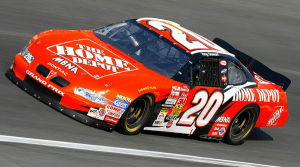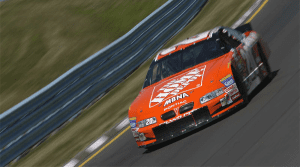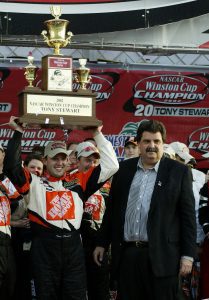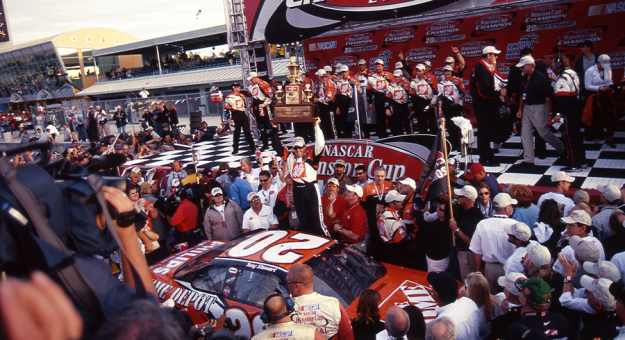On this day 20 years ago, the 2002 Ford 400 was run at Homestead-Miami Speedway.
What was the significance of that race?
NASCAR Hall of Famer Tony Stewart clinched his first NASCAR Cup Series championship on that day.
Upon hearing how long it’s been, Stewart let out a laugh, almost in disbelief.
“Old. That’s what it does. It makes you feel old,” Stewart told SPEED SPORT. “I didn’t even think about that, how long it’s been. That’s the first gut reaction is when somebody says, ‘Oh, yeah, it’s been 20 years since your first cup championship.’ Old is how you feel.”
But a day that ended in a championship celebration, doesn’t tell the whole story for the No. 20 Joe Gibbs Racing team that season.
Underneath the surface, was a year of turmoil, hardships and perseverance.
According to Stewart, the championship run really began at the 2001 awards banquet in December. Stewart won three races that season and was runner-up to Jeff Gordon in the standings.
“I know we finished strong. I remember being at the banquet at the end of 2001 and sitting there being the last guy to go before the champion and getting to watch Jeff do his speech, and just how incredible I thought it was,” Stewart said. “This is a guy that really paved the way for guys like myself to come race in NASCAR. To run second to him in the points, I thought was really cool.
“We knew we had speed, we knew we had performance, we knew that it wasn’t like we backed into second in the championship that year, we knew that we were contenders. It was just a good feeling to know that, ‘We keep doing what we’re doing and stay on our game that, hopefully, that can be us next year.’”
The winning attitude was there for the No. 20 team. Heading into their fourth season together, they’d already established themselves as a threat, and intended to make a statement early in 2002.

Despite a victory in the Bud Shootout at Daytona Int’l Speedway and a sixth-place qualifying effort, Stewart’s 2002 Daytona 500 went up in smoke on the first lap of the season.
A blown engine in The Great American Race set the No. 20 team into a deep hole, 43rd in points.
Though his bad luck was short-lived, with three top-five finishes in a row, including a victory at Atlanta Motor Speedway. Another victory at Richmond (Va.) Raceway came later on in the spring, vaulting the driver of the No. 20 Home Depot Pontiac into the top 10 in points.
“We just honestly went out and did our jobs each week. We didn’t look at the points,” Stewart said. “There wasn’t a big master plan going into that season. It was literally just going and doing our jobs week in and week out and trying to do everything we could to win the races. We felt like that if we did our job, and we won races that the points would take care of themselves.”
As summer came, Stewart was up to fifth in points with his hometown track, the Indianapolis Motor Speedway, just ahead on the schedule.
Stewart won the pole for the Brickyard 400, but after leading 43 laps, he finished 12th.
“When you grow up, and that’s your dream when you’re a child, you’re racing, go-karts. Just to have the opportunity to race at Indy was a dream,” Stewart said. “Then, you want to have that opportunity to, hopefully, win the Indy 500. That came and went in the five years, that I got to run Indy.
“I think in ’02 that year, you wonder if you’re ever going to accomplish it. The amount of pressure that I would put on myself going into that week. It just made you a powder keg getting ready to go off at any moment. You wanted it so bad, and you wanted to have a good run, but it’s just hard. It’s definitely hard. It’s something that no matter how bad you want it, you can’t just make it happen. It just doesn’t. It’s never going to fall in your lap.”
As Stewart walked away from his orange No. 20 machine, an altercation with a photographer prompted the turning point of the season.
The ramifications of Stewart’s actions brought $60,000 worth of fines from both NASCAR and his sponsor Home Depot. Stewart was placed on probation for the rest of the season.
“At some point, you just got to grow up and I think back then I was still in that stage where I hadn’t grown up all the way yet,” Stewart said. “I had always been taught to fight for what I believed in and, and that’s what I did. I always fought for what I thought was right and what I believed in and what I thought was the right thing.
“Sometimes what I thought was the right thing in the big picture really wasn’t.”
While Stewart’s actions were the talk of the town heading to Watkins Glen (N.Y.) Int’l, Stewart led 34 laps and earned his third victory of the season.

“I think in my career, and especially with my NASCAR career where there were a lot of odd moments and moments that I’d love to go back to, I think the saving grace was always every weekend, you got a chance to go back to the race track and go do what you love doing,” Stewart said. “None of those distractions were there when you got that helmet on, there weren’t distractions and those worries.”
With the incident behind him, Stewart and the No. 20 team focused on winning a championship.
A streak of five consecutive top-10 finishes, along with challenges for title contenders Mark Martin and rookie Jimmie Johnson, allowed Stewart to take the points lead with six races left in the season at Talladega (Ala.) Superspeedway.
“We had a young team. We were in our fourth year at that point,” Stewart said. “I think everybody was well established, we all knew each other well, and we all knew at that point at Talladega, that we had a shot to win this thing. We just had to stay the course and keep doing what we were doing that got us there.”
With an 89-point advantage over Martin heading into the season finale, Stewart sought out the guidance of his teammate, Bobby Labonte, to help prepare for the challenges of competing for a title.
“He was my teammate, he had won the championship in 2000. He knew what those pressures were like,” Stewart said. “So it was, I feel like a huge advantage to have someone like him in your corner that knew and understood what I was going through and knew what the stresses and strains of that weekend were going to be like.”
After starting sixth, Stewart and the No. 20 team dealt with adversity throughout the 400-mile event.
“I don’t know whether it was car whether it was me, but we didn’t perform well,” Stewart said. “We tested really well at the test session. We went down there for the race, it was like we didn’t even test at all. But I remember us getting a lap down.
“I remember it was one of the pivotal moments in the race. The lead lap cars lined up on the outside row and the lap down cars lined up on the inside row. I remember Dale Jarrett was leading the race,” Stewart continued. “I was the first car on the lap down line, so it was myself and Dale on the restart. Most of the time lap-down cars were very courteous to lead lap cars every race.”
“But in that scenario, I couldn’t do that. I had to sit there and claw and try to get myself back at least ahead of the leaders in case the caution came out, to get myself back on the lead lap. I had to race him really hard, and I sat there and worried about, ‘Was he going to be upset?’ Because he’s trying to win the race, and I’m just racing the daylights out of him trying to get that spot.

“After it was all said and done, and when I finally saw Dale, he goes ‘I knew what you were up against. I knew you had to run 100 percent.’ If it would’ve went a full stint, there’s no way I could have held him off. It’s not like he would have tried to just run by me as quick as he could. I was really hard on my tires and using everything I could get every lap and that wasn’t going to last. Luckily, we got we caught the caution that we needed. It got us back on the lead lap and then I think we had to finish better than 22nd (to win the title). We finished 18th. That was a pivotal moment.”
After a near championship-altering scenario, Stewart hung on.
“I just remember coming off a turn four and going, ‘Just get to the line.’ Those last 10 laps you start hearing every sound, every noise, that you think is there, that’s not happening and your mind starts playing games with you.”
For Stewart and the No. 20 team, it was a sigh of relief.
An integral part of Stewart’s success in 2002 came from crew chief Greg Zipadelli. Better known as “Zippy,” Zipadelli and Stewart became one of NASCAR’s top crew chief-driver duos in the series for 10 seasons.
After the race, the two embraced and soaked up the moment.
“It was cool, not only with Zippy, but just all those guys, because the entire team had been together for four years,” Stewart said. “It was great, because Zippy is still to this day, like a big brother to me. To be able to sit there and start as rookies in the series together. Then four years later, you go out and grab your first championship together. It doesn’t get any better than that. That creates a very strong bond, that’s hard to break.”
Stewart won two more titles, and later became a team owner with Stewart-Haas Racing.
As he looked back on the championship that helped kickstart his Hall of Fame career, Stewart pointed to the history behind it.
“The thing that it did do for me was I felt like I was part of a unique fraternity of being a Cup champion,” Stewart said. “We had won races and by ’02, I’d say I felt like we had a good relationship with the majority the drivers and respect of the drivers.
“But to really have that championship and know that you’re part of motorsports history in that series was special. The rest of it, I still had growing up to do personally, but the fact that we were able to win that championship though was huge. To be able to say, by the end of ’02 that we’d won the USAC Triple Crown and National Championship and an IndyCar championship and then now, a NASCAR championship.
“We had made history at that point at the end of ’02 by doing something that nobody’s ever done. Winning an IndyCar and NASCAR championship.”
Follow @DHoffmanMedia22